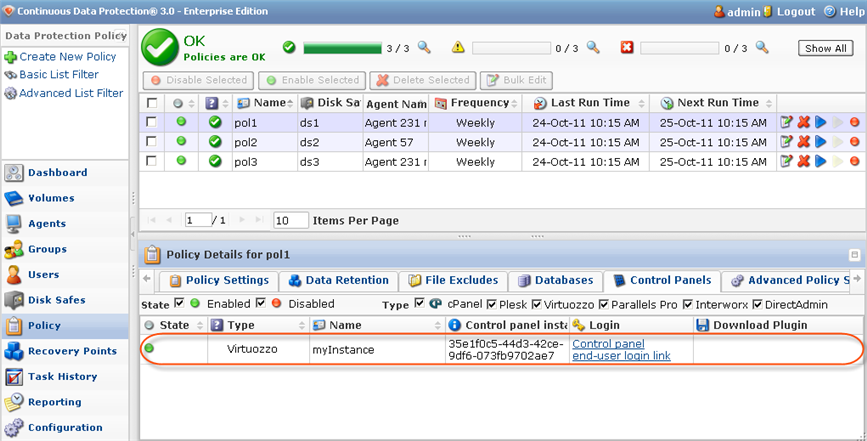Follow the instructions below in your CDP Enterprise or Advanced Edition to add a new Control Panel Instance to the policy.
1. Select the "Control Panels" tab in the Policy properties window. You can do so while creating a new Policy as shown below.

You can also select the "Control Panels" tab in the "Edit Policy" window after the Policy has been saved and even run. See Editing Policies. 
2. On the "Control Panels" tab of the Policy window, click on the "Add Control Panel Instance" button. 
3. The "Add Control Panel Instance" window will appear. Familiarize yourself with the introductory information and click "Next" to proceed with adding the instance.
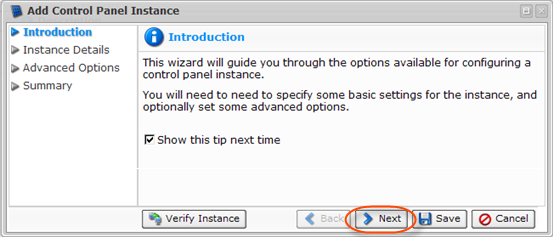
4. On the following "Instance Details" screen you can define options for your Control Panel Instance:
- Enabled - Use this checkbox to enable or disable the Control Panel Instance. If an instance is disabled, it will not be discovered during replication, and control panel users will not be able to access their data from any recovery points created while the instance is disabled.
- Name - Define name for the Control Panel Instance to identify it. A control panel instance's name must be unique to its policy, meaning no more than one instance associated with a policy can have a certain name.
- Description - Enter additional information about the Control Panel Instance. It is optional information, but if specified must also be unique to the policy.
- Type - The type of the Control Panel Instance. It specifies what kind of control panel is being configured and can be defined as:
- cPanel
- Plesk
- Virtuozzo
- Parallels Pro
- Interworx
- DirectAdmin
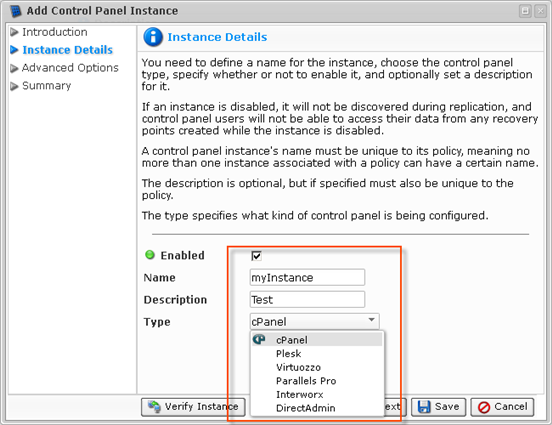
Click "Next."

5. If your control panel is installed inside a Virtuozzo container you need to specify the Virtuozzo Container ID (cPanel, Plesk, Parallels Pro, Interworx, DirectAdmin types). This advanced option is not available for Virtuozzo control panel type.
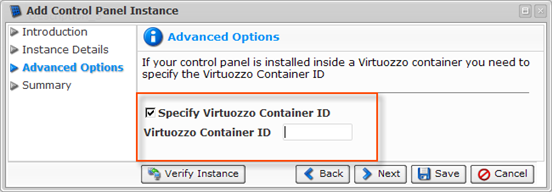
6. Click "Next."

7. On the last "Summary" screen, the settings you have selected are listed.
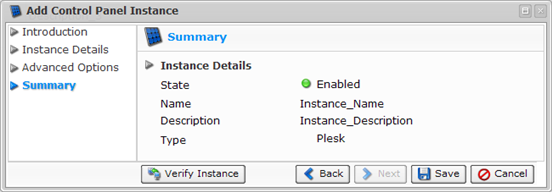
8. You can verify the Instance before saving by clicking "Verify Instance" button.

If the verification is successful, the dialog window appears. Click "OK."

If the verification failed, the "Error Messages" window will appear. It means that CDP cannot find the control panel type specified. Make sure you have selected the correct control panel type.
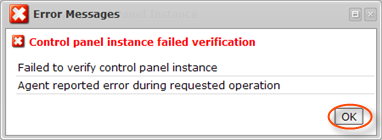
Click "OK" and try to eliminate the error. Then verify the Instance again.
9. Once you have verified that the specified settings are correct, click "Save" to add your Control Panel Instance to the Policy.

10. The wizard screen closes and the added Control Panel Instance appears on the "Control Panels" tab of the Policy window. Instance options are displayed in the appropriate columns.

The following actions over the Control Panel Instance are available via the icons:
- Edit - Allows you to change and add instance's options.
- Verify Instance - Verifies that the instance actually exists on the specified agent.
- Disable - Makes instance disabled. It will prevent the instance from being discovered during replication, and control panel users will be unable to log in to the CDP Server to retrieve their data.
- Delete - Removes the instance without prompting to confirm.
11. Click on the "Save" button in the Policy window to save the changes.

12. Once you have added the Control Panel Instance to the Policy, the system displays a direct link to CDP for Control Panel users in "Login" column. Using the link, users can access their backups and restore data as .zip or .tar file. To log in, they use their Control Panel credentials.
